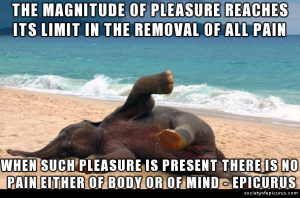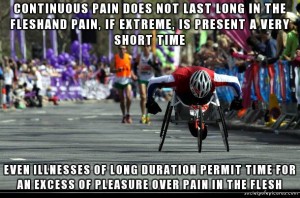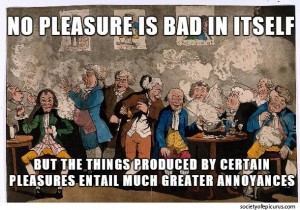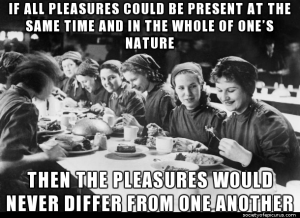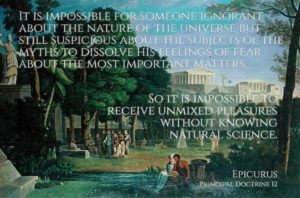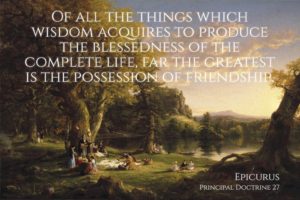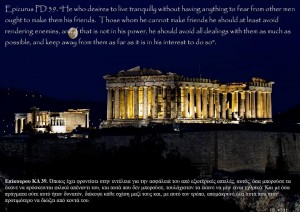One must laugh and philosophize and tend to one’s home life and use one’s other goods, and always recount the pronouncements of true philosophy. – Epicurean Saying 41
γελᾶν ἅμα δεῖ καὶ φιλοσοφεῖν καὶ οἰκονομεῖν καὶ τοῖς λοιποῖς οἰκειώμασι χρῆσθαι καὶ μηδαμῇ λήγειν τὰς ἐκ τῆς ὀρθῆς φιλοσοφίας φωνὰς ἀφιέντας.
ES 41 contains instructions for an active, engaged way of practicing Epicurean philosophy. The purpose of this essay is to place this practice before our eyes so that we may better understand what it consists of.
As for the translation of this passage, οἰκονομεῖν (oikonomein, or governing the house, from nomein, which relates to law / nomos, and oikos, which relates to home; it relates to economics and in general to managing one’s household); μηδαμῇ λήγειν (medamé légein) translates as “never ceasing”; ὀρθῆς (órthés, the suffix of “orthodox”) means “right” or “correct”, and paired here with φιλοσοφίας (filosofías) it refers to the right philosophy; φωνὰς (fonás) refers to voices or utterances, and shares semantic roots with words like “telephone”; and finally ἀφιέντας (áfiéntas) has to do with emitting, or sending out in all directions. I started using the acronym offa to refer to “órthés filosofías fonás áfiéntas” when I first realized this passage referred to a way of practicing Epicurean philosophy that deserved further exploration, and I now refer to the act itself of cheerful repetition of the Doctrines while engaged in other activities as offa practice. Notice that fonás áfiéntas implies an out-loud repetition, not a silent or inward, meditative repetition. Offa is a cheerful, active, assertive practice.
So the image we get from this passage is of a votary of Epicurean philosophy who is practicing memorization and repetition while managing his household and business, all the while laughing and enjoying himself. Laughter is, in fact, the first requisite of the practice. If we’re not enjoying ourselves, we’re not doing it right. Also, this particular practice is carried out in the midst of our ordinary activities.
This practice was likely established during the generations after the foundation of Epicurean philosophy. We know this because it’s found in the Epicurean Sayings (sometimes still known as the Vatican Sayings), and we know that this collection was published after the death of the Hegemon because it mentions Epicurus in the third person in ES 36, praising his gentleness and autarchy. We also know that Epicurus himself encouraged people to repeat and memorize outlines of his teachings, and we know that repetition and memorization are universally considered the most prevalent and well-known practices among Epicurean disciples, but we do not know of any specific methods or contexts for chanting, repeating, or memorizing, other than the description we find in ES 41.
This is not to say that we are not to have a shrine before which we memorize and repeat: that is another way of practicing. But in the case of offa / ES 41, the idea is that we are to repeat out loud in every direction (fonás afientas) whatever Epicurean Doctrines we’re in the process of learning that day, or that week, or that month. Each practitioner may have or develop his or her own way of happily weaving the Doctrines into their casual self-expression.
Singing while working can be disruptive to our co-workers in some environments. If this is the case, then use prudence and only practice when you’re not generating annoyances for others. But in most cases, singing while engaging in other activities generally raises our spirits. I often sing while I shower, as my grandfather did (very happily, and his happiness was contagious).
Singing while working–studies suggest–is good for your happiness and productivity. One of my previous employers (in a call center) used to always have pop music playing in the background in order to lift our moods (and I think it mostly worked). Many cultures and tribes have particular songs that they use while making bread, pounding yam, gathering foods, or cooking. In this way, unavoidable labor that might otherwise feel harsh is softened and made more enjoyable.
There have been many questions (which sometimes come off as accusations, when coming from enemies of our School) concerning what practices the Epicureans actually engage in. It seems like, to some people, studying and reading philosophy is not enough to be considered a “practice” of philosophy. This is the reason why I wrote an essay introducing meleta some time ago, and why I’m discussing offa now. To some people, praxis requires either meditative or contemplative practices, or chanting, or rituals. In truth, KD-Praxis (Practice of the Kyriai Doxai, or Principal Doctrines) may include all of the above. In my book Tending the Epicurean Garden, I dedicated a whole chapter to how to develop your hedonic regimen, and another one to the science of contemplation, both of which cited relevant scientific studies.
Offa is an engaged way of practicing the Doctrines. We may become a votary of Epicurean Saying 41 by vowing to repeat a particular Doctrine that we are trying to memorize, by repeating it frequently in song or chant for a day, or for a week, or for a weekend, or for a month. In this way, we memorize and become experts in the Doctrine we choose to repeat. For instance, I’ve often repeated in recent months the second part of PD 3, and it has yielded many great insights:
Whenever and wherever
Pleasure is present
there is neither pain in the flesh
nor anxiety in the mind.
Choosing a short, easy passage such as this one allows us to cultivate our attention, to focus only on that passage. Sometimes when we chant rhythmically, we may enter into a trance. This can be quite enjoyable, and benefits specific parts of the brain (see Note 1), inducing the emission of delta waves. Delta waves have a role in sleep, and–accoding to this essay–“delta wave activity has also been purported to aid in the formation of declarative and explicit memory formation“. Therefore, offa (and other forms of repetition or chanting) may have a role in the type of neuroplasticity that Epicurus posited as part of his materialist conception of moral development.
Philodemus of Gadara argued that the medicine of the Doctrines is in the words, and–while music and rhythm are not themselves without utility–sincere Epicurean practitioners should pay attention to their (subconscious or conscious) reactions, associations, or any other insight that emerges from their minds while chanting, and be aware of them. I have found that mindful repetition often discloses connections with other teachings in our minds, or other pragmatic repercussions of the Doctrine, and in this way it aids in the acquisition of full cognitive assimilation of the Doctrine. For instance, “Death is nothing to us” (PD 2) says (implicitly) that life, to us, is sentience, not only that death is non-sentience. We can gain insight from the things the Doctrines do not say, but imply, in addition to the things that the Doctrines say.
We do not know how the ancient Epicureans practice repetition and memorization, only that they did. We also do not speak their languages. Therefore, modern Epicureans would have to develop our own authentic ways of practicing in our native languages. For all these reasons, I think we should pay close attention to the words in ES 41, and carry out experiments while finding ways to incorporating offa into our Epicurean practice.
Note 1:
In my book, I cite a study by Marian Diamond that shows that chanting lowers blood pressure and slows the heart rate, generating a state of relaxation. However, the studies on chanting, and of meditation in general, have advanced a bit. This study shows that religious chanting affects a different part of the brain than prayer and various kinds of meditation, and that it has its own psychotherapeutic benefits. This study reveals that chanting help the brain to emit delta waves and affects the posterior cingulate cortex, which has many functions. This other study–specifically on Vedic chanting–shows that it helps in the treatment of anxiety and induces relaxation. This other study says:
prayer/religious practices may have cross-cultural universality in emotion regulation. This study shows for the first time that Buddhist chanting, or in a broader sense, repetition of religious prayers will not modulate brain responses to negative stimuli during the early perceptual stage, but only during the late-stage emotional/cognitive processing.
These studies are useful, but since the canon is empirical and based on enargeia (immediate experience), with repetition and memorization, the proof is in the pudding, and we will only learn what works for us once we experiment with it.




